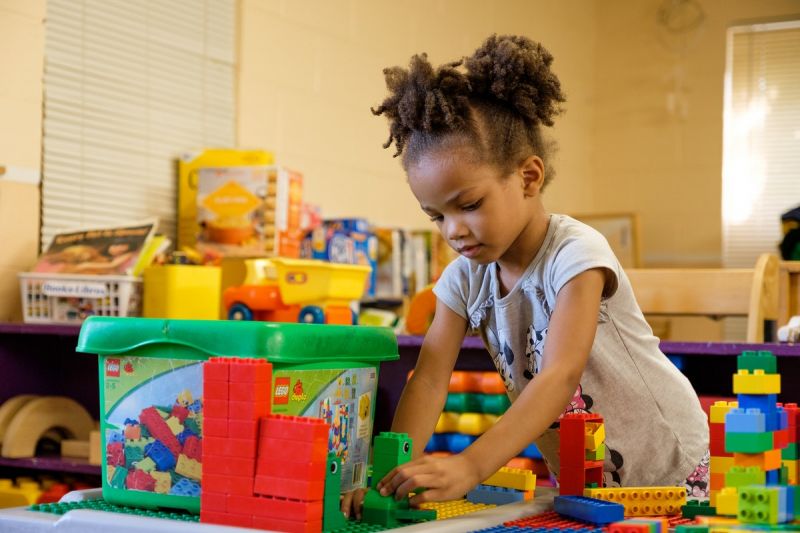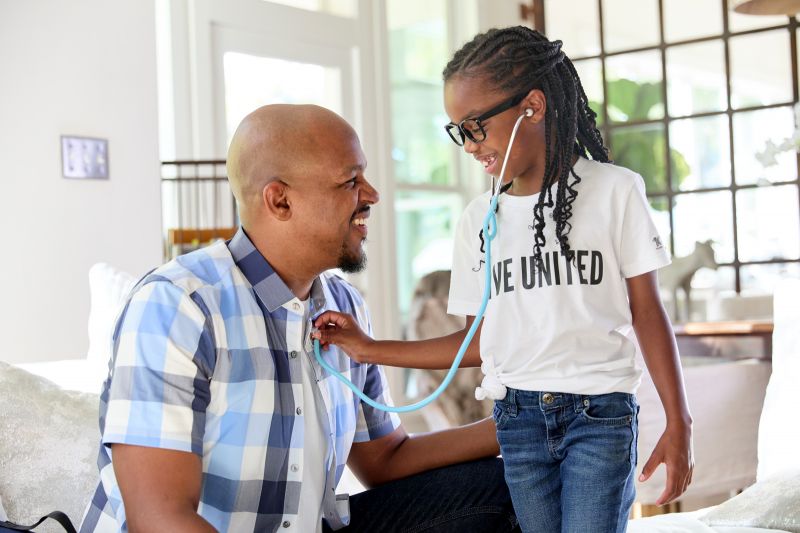Checking in on Progress Toward Our Aspire United 2030 Goals

At United Way of Metropolitan Dallas, we just released our newest Impact Report, which explores how supporters like you made a positive impact for 1.6 million North Texans—or more than 20% of our region’s population—in our 2022-2023 fiscal year.
How does that incredible impact affect our mission in North Texas? Let’s take a closer look at the goals that we are working toward, how we measure progress and what the latest data reveal about education, income and health in our region.
Our Aspire United 2030 Goals
As we lead and invest in programs that improve access to education, income and health across North Texas, we keep a close eye on our progress so we know we’re truly making an impact.
At United Way, we know it’s not enough to create a one-time impact in someone’s life. To drive real, lasting change, we focus on challenges that have kept generations of North Texans from truly thriving. And to create lasting change, we know we must quantify our goals and closely track our progress.
We collaborated with a broad spectrum of community partners to develop the Aspire United 2030 goals: our North Star for driving transformational change in education, income and health across North Texas through the year 2030:
- Increase by 50% the number of students reading on grade level by third grade.
- Increase by 20% the number of young adults who earn a living wage, adding more than $800 million per year to the local economy.
- Increase to 96% the number of North Texans with access to affordable healthcare insurance.
Every 10 years, we reassess and refine our goals to address new challenges and opportunities. As we continue the march toward our Centennial year and our second century of service, setting 10-year goals enables us to ensure we always remain effective.
Evaluating and Tracking Our Goals
Setting and closely tracking quantifiable 10-year goals and leveraging a third-party evaluator are key differentiators in our unique approach to community impact work.
We track progress toward our Aspire United 2030 community goals through our partnership with the Parkland Center for Clinical Innovation (PCCI), an alumnus of our Social Innovation Accelerator.
Since PCCI’s Accelerator experience, the team has gained a rare degree of expertise in leading healthcare topics, including social determinants of health, and has pioneered ground-breaking solutions to more effectively identify needs, prioritize services, empower providers and engage patients in Dallas County and across the country. Meanwhile, PCCI has honed its expertise in defining and measuring near, mid- and long-term successes, and how to communicate impact. As a result, they were an ideal organization to help United Way track progress toward our community-wide Aspire United 2030 goals.
Progress Toward Our Goals
Curious about how our work—and your support—impact education, income and health in our region? Read on for an overview of the most recent data on our key impact measures in each area, or click here to view our latest Aspire United 2030 report. (These are the newest datasets available, and they do not necessarily reflect our most recent progress in these areas.)
Education
Third-grade reading proficiency decreased an average of 8% (from 55.59% to 47.43%) when compared to the prior year, based on 2021 Texas Education Association data. While decreases were seen across our entire service area, the greatest decline was observed in Dallas County (-10%).
We can attribute this to the ripple effects of the COVID-19 pandemic and its profound impact on early childhood learning. During the height of the pandemic, North Texas students experienced months of school disruption and uncertainty that led to significant learning loss—and many young scholars are still recovering.
This 2021 data indicates that progress toward our Aspire United 2030 goals is even more critical than it was before the pandemic. To ensure children are set up for success in school, our education programs include:
- Once Upon A Month™: This early literacy program delivers free age-appropriate children’s books and parental reading guides to families every month, stimulating curiosity, language development and learning skills—all of which set kids up for success in kindergarten. In our last fiscal year, United Way and our supporters provided nearly 130,000 free books to more than 11,000 local families.
- Heal Play Learn: Made possible by a grant from Texas Instruments Foundation, this partnership with Educate Texas delivers hands-on learning opportunities to students in Lancaster, DeSoto and Cedar Hill school districts to encourage social and emotional wellness, physical activity, creativity, collaboration and critical thinking skills. Last summer, 670 students participated in 75 hours of hands-on programming.
- Healthy Outcomes through Prevention & Early Support (HOPES) and Texas Home Visiting Program: These parent education initiatives provide families with hands-on instruction, community resources and skills that empower parents, encourage healthy child development and prevent child abuse. Last fiscal year, 885 families participated in a home visiting program.
Income
All counties in our service area saw a small improvement (about 2%) in the percentage of adults earning a living wage, as reflected by 2019 American Community Survey data. Rockwall County experienced the greatest increase, at 3.2%.
By investing in North Texans through job training and certification programs, we can ensure more of our neighbors have access to living wage jobs. The vast majority of low-wage jobs (such as retail, hotel/food service, construction, transportation warehouse/manufacturing and healthcare support) are filled by individuals with a high school degree or less, and they provide an annual salary of around $32,000 per year. With additional education, average salaries increase by about $20,000 a year, which can have a transformative impact on a person’s entire family, supporting their children’s success in school and enabling them to access high-quality healthcare.
To create pathways to better-paying jobs for more North Texans, our financial stability programs include:
- Pathways to Work: This workforce development program, in partnership with 36 community organizations, gives hardworking North Texans the training necessary to secure jobs in IT or healthcare. Last year more than 20,000 North Texans participated in Pathways to Work programming, which led to 1,870 degrees or certifications and nearly 3,000 job placements.
- Dollars for College: This partnership with Communities Foundation of Texas seeds college savings accounts for low-income students, making them significantly more likely to attend and graduate college. In 2022-2023, our supporters enabled us to open 166 new college savings accounts and deposit more than $140,000 for low-income students.
- Housing Stability: We work to prevent homelessness in North Texas by creating programs and forming strategic partnerships that encourage housing stability. In 2022-2023, this work provided more than $3.8 million in rent and utility assistance to nearly 600 households. We also advocated for affordable housing and continued our leadership of the Dallas Rental Assistance Collaborative, which provides rental and utility assistance to keep families in their homes during challenging economic times.
Health
There was essentially no change in the percentage of individuals with health insurance coverage, as reflected by the 2019 American Community Survey. However, Texas is typically one of the worst states in the nation in terms of health insurance adoption, and lack of health coverage disproportionately impacts Black and Hispanic families, especially those with young children. Without health insurance, families often forego care or pay out of pocket, which can negatively affect their financial stability, hurt children’s performance in the classroom and limit adults’ earning potential.
However, Texas is seeing improved rates of insured individuals overall. Our state had nearly 570,000 new signups for affordable health care plans in 2023—the largest jump in the nation—and North Texas was a leader in that growth.
At United Way, our Healthcare Navigators program helped to make health insurance more accessible for thousands of North Texans. This collaborative program provides a network of certified Healthcare Navigators for the North Texas community, delivering support for individuals and families looking to sign up for health insurance through the Marketplace, Medicaid or CHIP. Navigators work directly with clients to help them compare health plans, understand benefits and apply for subsidies to lower their monthly premiums. In our last fiscal year, Healthcare Navigators fielded 52,133 client inquiries and supported 6,703 individuals as they signed up for CHIP/Medicaid and an additional 1,250 as they enrolled in a qualified health plan.
We also expand access to health resources in our region through programs such as:
- Food access initiatives: Part of our work to improve food security involves supporting and amplifying summer meals programming to provide regular, nutritious meals to children who qualify for federally funded nutrition programs. In summer 2022, this program supported summer meals providers as they served more than 55.6 million regular, nutritious meals to 143,000 children in Dallas and Collin counties.
- Doorways to Health: This community partnership seeks to improve the maternal health outcomes of women in Dallas. Doorways to Health offers a variety of resources and programming, including home visiting and holistic maternal healthcare services, to ensure new and expecting mothers have the support necessary to thrive. In 2023, 326 pregnant people accessed resources through Doorway to Health providers. The partnership also hosted informative community events with hundreds of attendees to highlight the importance of maternal healthcare during Black Maternal Health Week.
Change Lives with Us
In the years since these datasets were gathered, United Way of Metropolitan Dallas and our supporters have only expanded our impact in North Texas. Last year, we changed the lives of nearly 1.6 million of our neighbors, and we’re poised to continue deepening that impact this year.
We invite you to be part of the change and help us drive progress toward our community-wide Aspire United 2030 goals:
- Invest in United Way. Make a one-time or recurring gift to directly support programs that improve access to education, income and health right here in North Texas.
- Volunteer with us. Engage directly in community impact by signing up as a volunteer for an upcoming project, such as the Point in Time Homeless Count or Reading Day.
Tags

Explore the Impact We Made Together
Together with dedicated supporters like you, we improved access to education, income and health for 1.6 million North Texans last year. Check out our Impact Report to learn more about the lives you helped change.


